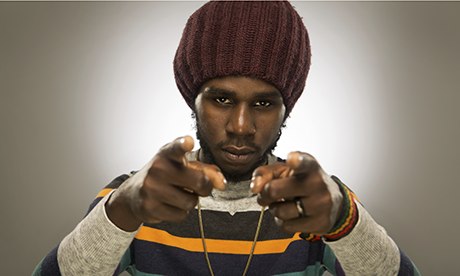Chronixx puts Rastafarianism back into Jamaican reggae
Dancehall's brash braggadocio isn't the only sound coming out of Kingston, something that Diplo has been quick to cotton on to
 Chronixx.
Chronixx.
Long before Snoop Lion was an unripe bud-dream in Snoop Dogg's bizong, Rastafarians were influencing and shaping Jamaica's notoriously prolific musical output. Count Ossie teamed up with the Mystic Revelation Of Rastafari (a Rastafarian drumming group), who provided the percussion for his 1962 ska prototype Oh Carolina (the same one that Shaggy sexed up in 1993). Meanwhile, acts such as Peter Tosh, Burning Spear, Dennis Brown, the Congos, Beres Hammond – plus some bloke called Bob Marley – all made sure Rasta culture remained synonymous with reggae music.
But dancehall's emergence in the 80s and 90s started to make roots and Rasta seem past it. Weed was replaced with cocaine as the drug of choice, traditional live takes of songs were usurped by computer-programmed instrumentation, and the message of a Rasta "Ital" lifestyle was ditched for brash braggadocio, face bleaching and dance crazes that mixed sexual contortionism with WWE moves (daggering).
But Rasta roots were never going to go quietly into the Kingston night, and now 21-year-old Chronixx (né Jamar McNaughton) has emerged as the figurehead of its latest revival. Son of roots head Chronicle, he was making tracks for dancehall royalty such as Konshens before he was out of his teens. But after playing at Usain Bolt's Tracks & Records restaurant, it was Chronixx's own take on the roots sound that was touted as the jump-off point for a "musical revolution" in his home country.
Along with artists such as Proteje and Jah9, he's set about toppling dancehall's hegemony and filling the void left by Vybz Kartel (who's still in prison) and Mavado (who's still trying to make it in America). Mixing anti-war messages, calls for equality and using a live band, Zinc Fence Redemption, Chronixx is modernising reggae staples and breathing new life into the roots reggae movement. That might all sound a bit self-righteous but, like Damien Marley, he manages to marry the snarling attitude of dancehall with lyrics about social cohesion in a way that doesn't make you nod off. He soon caught the eye of reggae-culture magpie Diplo, who put out Chronixx's Start A Fyah mixtape under the umbrella of his Major Lazer project.
Chronixx isn't just content to harp on about Rasta life though; he takes aim at those who promote vacuous poppy dancehall, such as Vybz Kartel's former bezzy mate, Popcaan. Chronixx took him to task on his 90s ragga throwback tune Odd Ras, where he literally told him to pull his pants up and made it clear he wasn't interested in new trends such as tattooing or face bleaching. Snoop Lion might claim to be "born again", but Chronixx is dishing out lessons in the real three Rs: Rasta, and roots reggae.
Chronixx plays The Drum, Birmingham, 12 Oct; Scala, N1, 13 Oc
Dancehall's brash braggadocio isn't the only sound coming out of Kingston, something that Diplo has been quick to cotton on to
-

- Lanre Bakare
- The Guardian, Friday 11 October 2013 08.00 EDT
- Jump to comments (9)
 Chronixx.
Chronixx. Long before Snoop Lion was an unripe bud-dream in Snoop Dogg's bizong, Rastafarians were influencing and shaping Jamaica's notoriously prolific musical output. Count Ossie teamed up with the Mystic Revelation Of Rastafari (a Rastafarian drumming group), who provided the percussion for his 1962 ska prototype Oh Carolina (the same one that Shaggy sexed up in 1993). Meanwhile, acts such as Peter Tosh, Burning Spear, Dennis Brown, the Congos, Beres Hammond – plus some bloke called Bob Marley – all made sure Rasta culture remained synonymous with reggae music.
But dancehall's emergence in the 80s and 90s started to make roots and Rasta seem past it. Weed was replaced with cocaine as the drug of choice, traditional live takes of songs were usurped by computer-programmed instrumentation, and the message of a Rasta "Ital" lifestyle was ditched for brash braggadocio, face bleaching and dance crazes that mixed sexual contortionism with WWE moves (daggering).
But Rasta roots were never going to go quietly into the Kingston night, and now 21-year-old Chronixx (né Jamar McNaughton) has emerged as the figurehead of its latest revival. Son of roots head Chronicle, he was making tracks for dancehall royalty such as Konshens before he was out of his teens. But after playing at Usain Bolt's Tracks & Records restaurant, it was Chronixx's own take on the roots sound that was touted as the jump-off point for a "musical revolution" in his home country.
Along with artists such as Proteje and Jah9, he's set about toppling dancehall's hegemony and filling the void left by Vybz Kartel (who's still in prison) and Mavado (who's still trying to make it in America). Mixing anti-war messages, calls for equality and using a live band, Zinc Fence Redemption, Chronixx is modernising reggae staples and breathing new life into the roots reggae movement. That might all sound a bit self-righteous but, like Damien Marley, he manages to marry the snarling attitude of dancehall with lyrics about social cohesion in a way that doesn't make you nod off. He soon caught the eye of reggae-culture magpie Diplo, who put out Chronixx's Start A Fyah mixtape under the umbrella of his Major Lazer project.
Chronixx isn't just content to harp on about Rasta life though; he takes aim at those who promote vacuous poppy dancehall, such as Vybz Kartel's former bezzy mate, Popcaan. Chronixx took him to task on his 90s ragga throwback tune Odd Ras, where he literally told him to pull his pants up and made it clear he wasn't interested in new trends such as tattooing or face bleaching. Snoop Lion might claim to be "born again", but Chronixx is dishing out lessons in the real three Rs: Rasta, and roots reggae.
Chronixx plays The Drum, Birmingham, 12 Oct; Scala, N1, 13 Oc


Comment